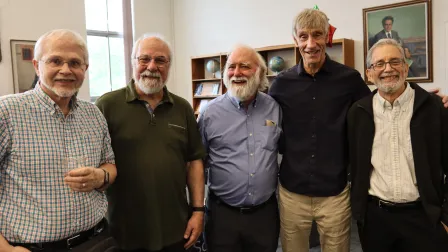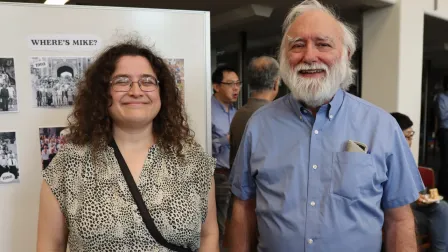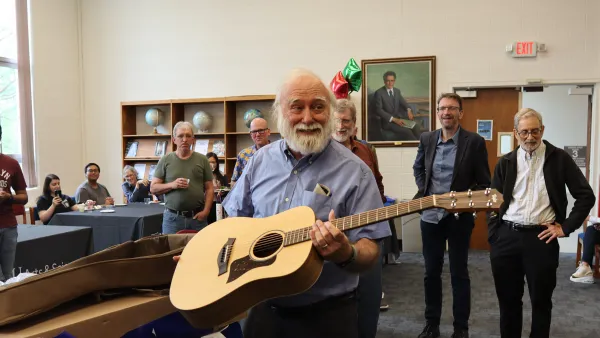After more than four decades of dedicated service, Professor Michael Ogilvie is retiring from the Department of Physics at WashU.
Since joining the faculty in 1984, Ogilvie has been a cornerstone of the department, known for his groundbreaking research in quantum chromodynamics, his unwavering commitment to students, and his friendly demeanor that magnifies his profound impact. Over the years, his work has steadily earned him national and international recognition, while his leadership has helped shape the department into a collaborative and supportive academic community.
A Thoughtful Scholar with a Profound Impact

Colleagues and students alike consistently describe Ogilvie as kind, thoughtful, and deeply principled. His humility is often the first thing people mention – but it’s always followed quickly by acknowledgments of his brilliance and generosity.
Emeritus Professor Carl Bender, who played a key role in recruiting Ogilvie to WashU, spoke warmly of his longtime colleague: “Mike is a sweet, gentle, really genuinely nice person. When you meet him, you like him.” That initial likability, Bender said, is paired with a remarkable ability to bring people together. “He’s the glue that held the department together,” Bender added, noting that Ogilvie’s collaborative spirit and steady presence helped bridge gaps across faculty lines and create an atmosphere of respect and unity.
Professor Wim Dickhoff, who joined the department the same year as Ogilvie, reflected on his colleague’s enduring commitment to both people and purpose: “He’s a great colleague; he’s always had the good of the department and our students very high up in his priorities, which isn’t always true for everybody.” Dickhoff emphasized that Ogilvie’s sense of duty – especially in departmental service and student support – was exceptional.
Professor Ken Kelton, a fellow physicist and office-neighbor of nearly 40 years, echoed these sentiments. In speaking about Ogilvie’s mentorship of undergraduate students, Kelton shared, “I’ve always been impressed at how he inspires them to go beyond.”
Bender remarked that Ogilvie’s steady influence often came not from bold declarations, but from quiet, consistent presence. “He’s been a great addition to the department because he’s so caring, he’s a great teacher, and just a great personality to have around,” Bender recalled. “He’s a catalyst that brought out the best aspects of other people in the department, just from force of personality.”

Emeritus Professor Anders Carlsson spoke highly of Ogilvie's impact, stating "I always appreciated his wisdom based on experience, his common sense, his concern for student well-being, and his knack for phrasing letters in just the right way. His shoes will definitely be hard to fill."
Through these conversations with those who know Ogilvie well, it's clear that his impact on the department has gone far beyond research and teaching. In faculty meetings, committee service, and hallway conversations, he brought thoughtful perspectives, a calm demeanor, and a deep sense of what truly matters in academia: intellectual curiosity, integrity, and the nurturing of future generations.
Mentorship that Transcends Generations
Perhaps the most enduring aspect of Ogilvie’s legacy lies in the lives and careers of the many students he mentored – students who have gone on to become respected scientists and educators. Ogilvie is known for treating students as intellectual equals, welcoming their questions, encouraging their ideas, and celebrating their successes as if they were his own.

Stella Schindler first met Ogilvie when she was still in high school, a time when many future physicists are just beginning to imagine the possibilities of a career in science. Ogilvie saw potential in her right away and became a steady guide through every stage of her academic journey.
“As someone who has benefited from Mike’s wisdom all the way from high school to my postdoctoral years,” she said, “I have seen firsthand that he is an amazing mentor for all career stages. I can’t believe I met him over a decade ago, but I’m so glad I did.”
Their collaboration extended through undergraduate research, a PhD thesis that earned Schindler the prestigious Sakurai Dissertation Award from the American Physical Society, and eventually into postdoctoral work, where they’ve co-authored many exciting papers. Schindler also won the Hoffman Postdoctoral Fellowship at Los Alamos National Lab, for which she credits a great deal to Ogilvie. Along the way, they’ve continued to meet regularly to discuss research ideas, offer advice, and continue professional development.
Schindler is quick to point out that Ogilvie’s mentorship wasn’t just academic – it was personal. “He is really encouraging and has supported me through thick and thin; he’s gone above and beyond to help me navigate obstacles. He's extremely supportive of women in physics and is always a good listening ear. Without him, I would not be on nearly the trajectory I am.”
Christopher Aubin, another former student who is now a professor at Fordham University, similarly recalled the generosity of Ogilvie’s mentorship. “I think one thing I gained from him was to not worry about making mistakes. As in, one doesn’t need to be seen as perfect at all times, as it’s from our mistakes that we learn more than when we don’t make them.”
That approach left a lasting impression. Years later, Aubin said he still draws on Ogilvie’s example in his own work with students. “Doing physics with him was always interesting because we were a team working on solving a puzzle,” he said. “He never treated me as lesser; he always made me feel like his equal.”
Pioneering Contributions to Physics
While his mentoring and service are deeply valued, Ogilvie’s contributions to theoretical physics stand among the most significant in his field. As a researcher, he helped advance the understanding of QCD, the fundamental theory describing the strong nuclear force that binds quarks and gluons inside protons and neutrons.
Emeritus Professor Claude Bernard summarized it: “Mike is one of the world’s experts on Quantum Chromodynamics (QCD). He has made very influential contributions to the understanding of QCD at high temperatures, and to the mechanism by which QCD confines quarks within hadrons.” Later adding, “I’ve always been impressed about his broad range of knowledge in physics, including stuff far from his areas of specialization.”
Schindler noted that Ogilvie has continued to push the field forward even in the later years of his career. “Mike shows that QCD has a new, previously unexplored symmetry called CK symmetry (combined charge + complex conjugation symmetry),” she explained. “He has capitalized upon this symmetry to develop powerful new analytic and numerical tools for studying QCD.”
Ogilvie's work has enabled breakthroughs in overcoming the “sign-problem” - a major challenge in computational physics. Building on this, he proposed a potential new phase of QCD matter, the “moat regime,” which may exist near the long-sought QCD critical point, which is something the QCD community has long been searching for.
In addition to his research and teaching, Ogilvie played a pivotal role in building and maintaining the department’s computational infrastructure. Kelton highlighted Ogilvie’s behind-the-scenes leadership in this area: “One of his most significant contributions was as a driving member of the computing committee. He guided the department in obtaining facilities for scientific computation.” These systems have supported the work of countless faculty and students and will remain part of his legacy.
It’s the kind of innovation and contribution that open new pathways for discovery – quietly revolutionary, much like Ogilvie himself.
A Fond Farewell
As Professor Michael Ogilvie steps into retirement, he does so with the admiration of colleagues, the gratitude of students, and the respect of the broader physics community. The foundation he helped build over four decades – scientifically, educationally, and personally – will support and inspire future generations for years to come.
Cheers to you, Mike – a bright physicist, a beloved teacher, and wonderful friend. Happy Retirement, you’ve earned it!




